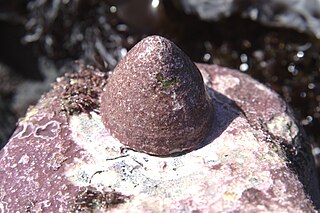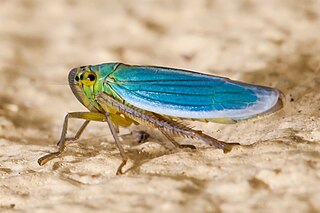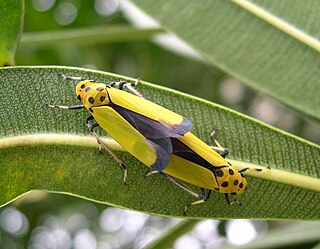
A leafhopper is the common name for any species from the family Cicadellidae. These minute insects, colloquially known as hoppers, are plant feeders that suck plant sap from grass, shrubs, or trees. Their hind legs are modified for jumping, and are covered with hairs that facilitate the spreading of a secretion over their bodies that acts as a water repellent and carrier of pheromones. They undergo a partial metamorphosis, and have various host associations, varying from very generalized to very specific. Some species have a cosmopolitan distribution, or occur throughout the temperate and tropical regions. Some are pests or vectors of plant viruses and phytoplasmas. The family is distributed all over the world, and constitutes the second-largest hemipteran family, with at least 20,000 described species.

Brochosomes are intricately structured microscopic granules secreted by leafhoppers and typically found on their body surface and, more rarely, eggs. Brochosomes were first described in 1952 with the aid of an electron microscope. Brochosomes are hydrophobic and help keep the insect cuticle clean. These particles have also been found in samples of air and can easily contaminate foreign objects, which explains erroneous reports of brochosomes on other insects.

The superfamily Membracoidea of sap-sucking true-bugs includes two of the largest families within what used to be called the "Homoptera": the leafhoppers (Cicadellidae) and the treehoppers (Membracidae). The other families in this group are quite small, and have, at various points, generally been included as members within other families, though they are all presently considered to be valid, monophyletic groups. The relict family Myerslopiidae is restricted to New Zealand and South America while the Melizoderidae consist of two genera restricted to South America. The great diversity of Neotropical taxa suggests that the group originated in that region.

Curly top is a viral disease that affects many crops. This disease causes plants to become smaller in size, have shriveled petals and leaves, and are twisted and pulled out of shape. They are often caused by curtoviruses, members of the virus family Geminiviridae. This disease is important in western United States, such as California, Utah, Washington, and Idaho.
David Allan Young, Jr., was an American entomologist who specialized in the taxonomy of the Cicadellidae and authored a comprehensive treatment of the family with numerous genera and species described and named by him. This work in three parts Taxonomic Study of the Cicadellinae covered 292 genera.

Emarginula is a genus of small keyhole limpets, marine gastropod molluscs in the family Fissurellidae.

Acmaea is a genus of sea snails, specifically true limpets, marine gastropod mollusks in the family Acmaeidae, one of the families of true limpets.

Graphocephala coccinea is a meadow and woodland-dwelling species of brightly colored leafhopper native to North and Central America, from Canada south to Panama. Common names include candy-striped leafhopper, red-banded leafhopper, scarlet-and-green leafhopper and red-and-blue leafhopper.

Graphocephala is a large genus of leafhoppers, found from southern Canada to northern South America.

The common brown leafhopper, Orosius orientalis (Matsumura) is one of the most common species of Australian leafhoppers with a very wide host range. It is an important vector of several viruses and phytoplasmas worldwide. In Australia, phytoplasmas vectored by O. orientalis cause a range of economically important diseases including legume little leaf, tomato big bud, lucerne witches broom, potato purple top wilt, Australian lucerne and the insect is a possible vector of Australian grapevine yellows. O. orientalis also transmits Tobacco yellow dwarf virus to beans, causing bean summer death disease and to tobacco, causing tobacco yellow dwarf disease.

Patella is a genus of sea snails with gills, typical true limpets, marine gastropod mollusks in the family Patellidae, the true limpets.

Fissurella is a genus of small to medium-sized sea snails or limpets, marine gastropod mollusks in the subfamily Fissurellinae of the family Fissurellidae, the keyhole limpets.

Vermetus is a genus of sea snails, marine gastropod mollusks in the family Vermetidae, the worm snails or worm shells.

Cicadella viridis, the green leafhopper, is a species belonging to the subfamily Cicadellinae of the family Cicadellidae.
Anagrus incarnatus is a species of fairyfly. It is an egg parasitoid of Cicadella viridis, several genera and species of Delphacidae (Hemiptera), and also Orthotylus virescens. It's native to the Palearctic.

Cicadellinae is a leafhopper subfamily in the family Cicadellidae.
Gonatopus clavipes is a species of small wasp in the family Dryinidae. It is a solitary wasp that superficially resembles an ant, and its larva is a parasitoid of leafhoppers in the subfamily Deltocephalinae. It has a Palearctic distribution, and within Europe parasitises at least eleven genera and thirty-one species of leafhopper.

Cicadellini is a tribe of leafhoppers in the family Cicadellidae. There are over 300 genera and several thousand described species in Cicadellini.

Iassinae is a subfamily of leafhoppers in the family Cicadellidae.
Amrasca biguttula, commonly known as the cotton jassid, is a subspecies of leafhopper belonging to the subfamily Typhlocybinae of family Cicadellidae. It is a pest of cotton, okra, and other crops in southern Asia.















